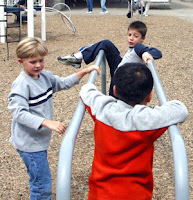Helping Aspergers Students Cope with Recess
"My son’s teacher told me that he gets nervous and often goes into a meltdown at recess time. During recess, the students usually either go to the gym or outside for 'free-time' recreation. How can I help him deal with this transition and the unstructured nature of 'free-time', thus avoiding a meltdown?"
Recess is a time when students traditionally run-off their stress, but this transition can be very challenging for a student with Aspergers or High-Functioning Autism. Students are given instructions, rules and a timetable to guide them through the rest of the day, but recess is rather unstructured, and it can be difficult for Aspergers students to know what to do during this time. Playgrounds are also often noisy and crowded places, with lots of children running around screaming and talking loudly. This can be daunting for a special needs youngster who is not aware of the "hidden" social rules of recess.
Here are some suggestions that may help your son overcome his difficulties with recess:
1. Some playgrounds have buddy benches for kids who are having difficulty making friends, or having a hard day. Decorations or signs should distinguish a buddy bench from other benches in the playground. Other kids are appointed as buddies and given a badge to wear to indicate who they are. Their job is to keep an eye out for anyone sitting on the buddy bench who feels sad or lonely and needs someone to cheer them up. A buddy can chat to them on the bench, or invite them to play a game. Having a number of kids share the buddy role will ensure that any youngster using the buddy bench socializes with different kids and does not become too reliant on one peer.
2. Some schools use break time to teach social skills to Aspergers kids, which can be done by using approaches such as circle of friends. The four main goals of this approach are to: (1) create a support network for the Aspergers youngster; (2) provide the youngster with encouragement and recognition for any achievements and progress; (3) work with the youngster to identify difficulties and devise practical ideas to help deal with these difficulties; and (4) help to put these ideas into practice. Your son might benefit from his school adopting such an approach.
3. Long periods of time in the playground may also challenge your son. Perhaps the school could agree that he only has to play on the playground for the first half of the period – and if he is successful during this time, he could be rewarded with quiet time in the library or time on the computer? This would need to be structured so your son knows what the activity is and where to go.
4. Setting up a number of different playground games that everyone moves around will bring some structure to recess, as well as reducing boredom from playing one game for the whole playground time. There are a number of websites suggesting playground games, many of which have video clips which you could watch with your son so she knows what to expect in different games. Your son could also have some tasks to do during recess (e.g., handing out basketballs, picking up trash on the playground, etc.), which would add further structure to his recess time. However, take care that this is not seen as a form of discipline and does not set him apart from his classmates too much.
5. Relaxation techniques could also help your son to recognize and reduce his anxiety before it becomes overwhelming. Techniques might include:
- breathing deeply
- counting to ten
- jumping on a trampoline
- kicking a ball
- punching a punching bag
- stretching
There are a number of books that help Aspergers kids learn how to identify stress and teach relaxation techniques.
6. Your son could indicate his nervousness to the teacher by using a help card or a visual stress scale (e.g., traffic light scale, thermometer, 1-5 scale, etc.). Stress scales can be used as a secret code between the student and his teacher, which might be useful if your son does not want to draw attention from his classmates. If your son indicates that he is at the high end of the stress scale, there should be a quiet place that he can go to calm down (e.g., in the library). He may also want to cut-out external noise by listening to music.
7. Your son might find school recess especially difficult because one-to-one "staff monitors" often take their own breaks at this time. However, if your son no longer needs support in certain lessons, but is experiencing high anxiety during break times, it’s possible that the hours could be restructured so that his monitor is with him during recess. Check with school officials to see what can be done.
My Aspergers Child: Preventing Meltdowns
COMMENTS:
• Anonymous said... A school administrator with a child on the spectrum said to me "We are not required to teach socialization in school." This statement was a relief, because the school didn't balk at his IEP stating recess & lunch would be in a quiet environment with one or two peers of his choosing.
• Anonymous said... I was going to say the exact same thing. Your son does not have to be forced to participate in recess. They can absolutely set up something else for him. Do not be afraid to be assertive with the school with your child's needs.
• Anonymous said... My son was also allowed a quiet zone for recess and lunch.
• Anonymous said... why are the school not providing him with a safe zone? my son was allowed in the library during break or on the sofa in the main reception area, where staff could supervise him while still having their own break
• Anonymous said... Yes, quiet zone is a must, and he should also be allowed to go there during class if it gets too much for him. My girl wouldn't be able to attend school at all unless she had this safe zone to go to.
Post your comment below…
COMMENTS:
• Anonymous said... A school administrator with a child on the spectrum said to me "We are not required to teach socialization in school." This statement was a relief, because the school didn't balk at his IEP stating recess & lunch would be in a quiet environment with one or two peers of his choosing.
• Anonymous said... I was going to say the exact same thing. Your son does not have to be forced to participate in recess. They can absolutely set up something else for him. Do not be afraid to be assertive with the school with your child's needs.
• Anonymous said... My son was also allowed a quiet zone for recess and lunch.
• Anonymous said... why are the school not providing him with a safe zone? my son was allowed in the library during break or on the sofa in the main reception area, where staff could supervise him while still having their own break
• Anonymous said... Yes, quiet zone is a must, and he should also be allowed to go there during class if it gets too much for him. My girl wouldn't be able to attend school at all unless she had this safe zone to go to.
Post your comment below…



